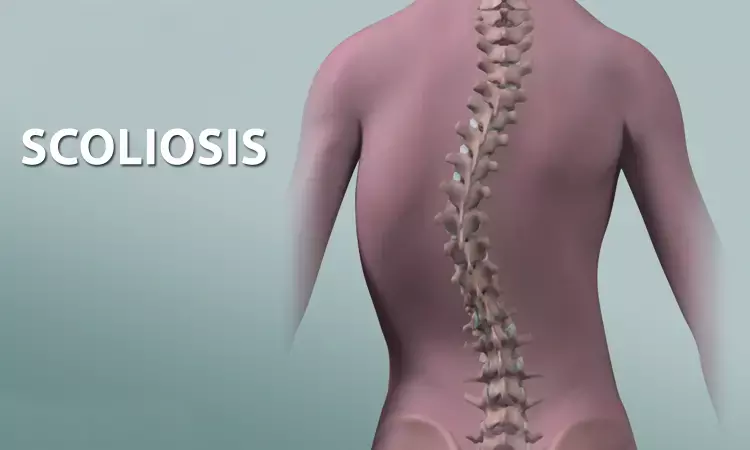- Home
- Medical news & Guidelines
- Anesthesiology
- Cardiology and CTVS
- Critical Care
- Dentistry
- Dermatology
- Diabetes and Endocrinology
- ENT
- Gastroenterology
- Medicine
- Nephrology
- Neurology
- Obstretics-Gynaecology
- Oncology
- Ophthalmology
- Orthopaedics
- Pediatrics-Neonatology
- Psychiatry
- Pulmonology
- Radiology
- Surgery
- Urology
- Laboratory Medicine
- Diet
- Nursing
- Paramedical
- Physiotherapy
- Health news
- Fact Check
- Bone Health Fact Check
- Brain Health Fact Check
- Cancer Related Fact Check
- Child Care Fact Check
- Dental and oral health fact check
- Diabetes and metabolic health fact check
- Diet and Nutrition Fact Check
- Eye and ENT Care Fact Check
- Fitness fact check
- Gut health fact check
- Heart health fact check
- Kidney health fact check
- Medical education fact check
- Men's health fact check
- Respiratory fact check
- Skin and hair care fact check
- Vaccine and Immunization fact check
- Women's health fact check
- AYUSH
- State News
- Andaman and Nicobar Islands
- Andhra Pradesh
- Arunachal Pradesh
- Assam
- Bihar
- Chandigarh
- Chattisgarh
- Dadra and Nagar Haveli
- Daman and Diu
- Delhi
- Goa
- Gujarat
- Haryana
- Himachal Pradesh
- Jammu & Kashmir
- Jharkhand
- Karnataka
- Kerala
- Ladakh
- Lakshadweep
- Madhya Pradesh
- Maharashtra
- Manipur
- Meghalaya
- Mizoram
- Nagaland
- Odisha
- Puducherry
- Punjab
- Rajasthan
- Sikkim
- Tamil Nadu
- Telangana
- Tripura
- Uttar Pradesh
- Uttrakhand
- West Bengal
- Medical Education
- Industry
Ultrasound could do away with need of X-ray for scoliosis screening in children: Study

Hong Kong: Ultrasound is useful for the identification of children who do not require specialist referral for follow-up X-rays, finds a recent study in the journal Ultrasound in Medicine and Biology. This could do away with a >50% reduction of unnecessary radiation for children undergoing scoliosis screening
Screening of scoliosis is important for timely initiation of brace treatment to lessen curve progression in skeletally immature children and adolescents. In Hong Kong, school scoliosis screening programs follow the protocol of referring children screened positive with a Moiré topography and scoliometer for confirmatory standard radiography.
The screening program was found to have a false-positive rate despite being highly sensitive (88%) in detecting those who require specialist referral which could lead to unnecessary X-ray radiation. Radiation-free ultrasound has been reported to be reliable and valid for quantitative assessment of cure severity in scoliosis patients. Tsz-ping Lam, The Chinese University of Hong Kong, Shatin, NT, Hong Kong SAR, and colleagues aimed to determine the accuracy of ultrasound in determining the threshold of referral that requires X-ray for children screened positive with the scoliometer and Moiré topography in a prospective diagnostic accuracy study.
For this purpose, the researchers recruited 442 schoolchildren with a mean Cobb angle of 14.0 ± 6.6°.
Key findings of the study include:
- The sensitivity and specificity of ultrasound in predicting the correct referral status, confirmed by X-ray, were 92.3% and 51.6%, with positive and negative predictive values of 29.0% and 96.9%, respectively.
- Receiver operating characteristic curve analysis revealed area under the curve values of 0.735 for ultrasound alone and 0.832 for ultrasound in combination with measurement of angle of trunk rotation.
"Our finding supports the accuracy of using ultrasound to determine referral status, which could result in a >50% reduction of unnecessary radiation for children undergoing scoliosis screening," concluded the authors.
Reference:
The study titled, "Using Ultrasound to Screen for Scoliosis to Reduce Unnecessary Radiographic Radiation: A Prospective Diagnostic Accuracy Study on 442 Schoolchildren," is published in the journal Ultrasound in Medicine and Biology.
DOI: https://www.umbjournal.org/article/S0301-5629(21)00250-7/fulltext
Dr Kamal Kant Kohli-MBBS, DTCD- a chest specialist with more than 30 years of practice and a flair for writing clinical articles, Dr Kamal Kant Kohli joined Medical Dialogues as a Chief Editor of Medical News. Besides writing articles, as an editor, he proofreads and verifies all the medical content published on Medical Dialogues including those coming from journals, studies,medical conferences,guidelines etc. Email: drkohli@medicaldialogues.in. Contact no. 011-43720751


